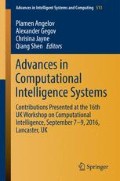Abstract
The Mamdani and TSK fuzzy models are fuzzy inference engines which have been most widely applied in real-world problems. Compared to the Mamdani approach, the TSK approach is more convenient when the crisp outputs are required. Common to both approaches, when a given observation does not overlap with any rule antecedent in the rule base (which usually termed as a sparse rule base), no rule can be fired, and thus no result can be generated. Fuzzy rule interpolation was proposed to address such issue. Although a number of important fuzzy rule interpolation approaches have been proposed in the literature, all of them were developed for Mamdani inference approach, which leads to the fuzzy outputs. This paper extends the traditional TSK fuzzy inference approach to allow inferences on sparse TSK fuzzy rule bases with crisp outputs directly generated. This extension firstly calculates the similarity degrees between a given observation and every individual rule in the rule base, such that the similarity degrees between the observation and all rule antecedents are greater than 0 even when they do not overlap. Then the TSK fuzzy model is extended using the generated matching degrees to derive crisp inference results. The experimentation shows the promising of the approach in enhancing the TSK inference engine when the knowledge represented in the rule base is not complete.
Access this chapter
Tax calculation will be finalised at checkout
Purchases are for personal use only
References
Mamdani, E.H.: Application of fuzzy logic to approximate reasoning using linguistic synthesis. IEEE Trans. Comput. C-26(12), 1182–1191 (1977)
Takagi, T., Sugeno. M.: Fuzzy identification of systems and its applications to modeling and control. IEEE Trans. Syst. Man Cybern. SMC-15(1), 116–132 (1985)
Zadeh, L.A.: The concept of a linguistic variable and its application to approximate reasoning - i. Inf. Sci. 8(3), 199–249 (1975)
Lee, C.C.: Fuzzy logic in control systems: fuzzy logic controller. ii. IEEE Trans. Syst. Man Cybern. 20(2), 419–435 (1990)
Kóczy, L., Hirota, K.: Approximate reasoning by linear rule interpolation and general approximation. Int. J. Approx. Reason. 9(3), 197–225 (1993)
Huang, Z., Shen, Q.: Fuzzy interpolative reasoning via scale and move transformations. IEEE Trans. Fuzzy Syst. 14(2), 340–359 (2006)
Huang, Z., Shen, Q.: Fuzzy interpolation and extrapolation: a practical approach. IEEE Trans. Fuzzy Syst. 16(1), 13–28 (2008)
Yang, L., Shen, Q.: Adaptive fuzzy interpolation and extrapolation with multiple-antecedent rules. In: 2010 IEEE International Conference on Fuzzy Systems (FUZZ), pp. 1–8 (2010)
Yang, L., Shen, Q.: Adaptive fuzzy interpolation. IEEE Trans. Fuzzy Syst. 19(6), 1107–1126 (2011)
Yang, L., Shen, Q.: Closed form fuzzy interpolation. Fuzzy Sets Syst. 225, 1–22 (2013)
Li, J., Yang, L., Shum, P.H., Sexton, G., Tan, Y.: Intelligent home heating controller using fuzzy rule interpolation. In: UK Workshop on Computational Intelligence (2015)
Molnarka, G.I., Kovacs, S., Kóczy, L.T.: Fuzzy rule interpolation based fuzzy signature structure in building condition evaluation. In: 2014 IEEE International Conference on Fuzzy Systems (FUZZ-IEEE), pp. 2214–2221 (2014)
Chen, S.M.: New methods for subjective mental workload assessment and fuzzy risk analysis. Cybern. Syst. 27(5), 449–472 (1996)
Sridevi, B., Nadarajan, R.: Fuzzy similarity measure for generalized fuzzy numbers. Int. J. Open Problems Compt. Math 2(2), 242–253 (2009)
Chen, S.J., Chen, S.M.: Fuzzy risk analysis based on similarity measures of generalized fuzzy numbers. IEEE Trans. Fuzzy Syst. 11(1), 45–56 (2003)
Niyigena, L., Luukka, P., Collan, M.: Supplier evaluation with fuzzy similarity based fuzzy topsis with new fuzzy similarity measure. In: 2012 IEEE 13th International Symposium on Computational Intelligence and Informatics (CINTI), pp. 237–244 (2012)
Chen, S.H., Hsieh, C.H.: Ranking generalized fuzzy number with graded mean integration representation. In: Proceedings of the Eighth International Conference of Fuzzy Sets and Systems Association World Congress, vol. 2, pp. 551–555 (1999)
Angelov, P.: Autonomous learning systems: from data streams to knowledge in real-time, J Wiley and Sons, (2012)
Bellaaj, H., Ketata, R., Chtourou, M.: A new method for fuzzy rule base reduction. J. Intell. Fuzzy Syst. 25(3), 605–613 (2013)
Konstantin, S.: Sugeno-type FIS output tuning (2010). http://www.mathworks.com/matlabcentral/fileexchange/28458-sugeno-type-fis-output-tuning
Rezaee, B., Zarandi, M.H.F.: Data-driven fuzzy modeling for takagi-sugeno-kang fuzzy system. Inf. Sci. 180(2), 241–255 (2010)
Li, J., Shum, H.P.H., Fu, X., Sexton, G., Yang, L.: Experience-based rule base generation and adaptation for fuzzy interpolationn. In: IEEE World Congress on Computation Intelligence Internation Conference (2016)
Tan, Y., Li, J., Wonders, M., Chao, F., Shum, H.P.H., Yang, L.: Towards sparse rule base generation for fuzzy rule interpolation. In: IEEE World Congress on Computation Intelligence Internation Conference (2016)
Author information
Authors and Affiliations
Corresponding authors
Editor information
Editors and Affiliations
Rights and permissions
Copyright information
© 2017 Springer International Publishing AG
About this paper
Cite this paper
Li, J., Qu, Y., Shum, H.P.H., Yang, L. (2017). TSK Inference with Sparse Rule Bases. In: Angelov, P., Gegov, A., Jayne, C., Shen, Q. (eds) Advances in Computational Intelligence Systems. Advances in Intelligent Systems and Computing, vol 513. Springer, Cham. https://doi.org/10.1007/978-3-319-46562-3_8
Download citation
DOI: https://doi.org/10.1007/978-3-319-46562-3_8
Published:
Publisher Name: Springer, Cham
Print ISBN: 978-3-319-46561-6
Online ISBN: 978-3-319-46562-3
eBook Packages: EngineeringEngineering (R0)

